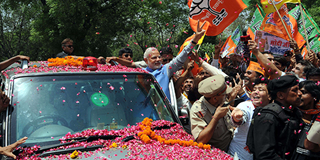Unless India's new prime minister, Narendra Modi, can deliver socially inclusive growth, his sweeping electoral triumph will prove short-lived. In that sense, his victory is the strongest possible proof that the consensus dating to India’s first prime minister, the democratic socialist Jawaharlal Nehru, remains firmly in place.
NEW DELHI – The victory of the Bharatiya Janata Party and its leader, Narendra Modi, in India’s general election last month has raised a crucial question about the country’s future. With the BJP sweeping to power on a platform of aggressive nationalism and business-friendly corporatism, has the socioeconomic consensus dating to India’s first prime minister, the democratic socialist Jawaharlal Nehru, come to an end?

NEW DELHI – The victory of the Bharatiya Janata Party and its leader, Narendra Modi, in India’s general election last month has raised a crucial question about the country’s future. With the BJP sweeping to power on a platform of aggressive nationalism and business-friendly corporatism, has the socioeconomic consensus dating to India’s first prime minister, the democratic socialist Jawaharlal Nehru, come to an end?